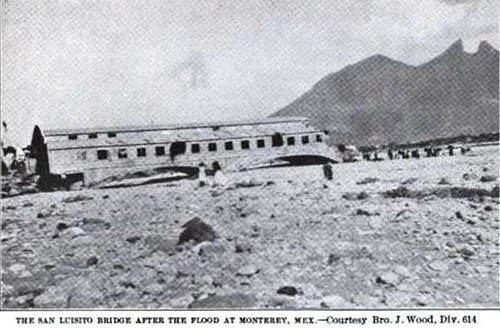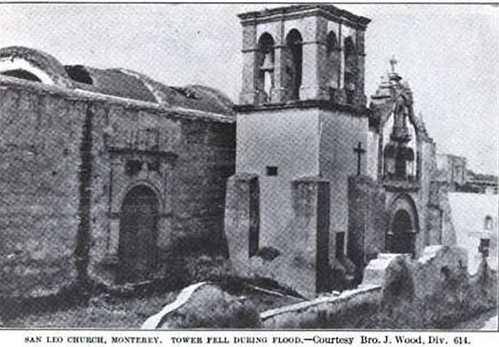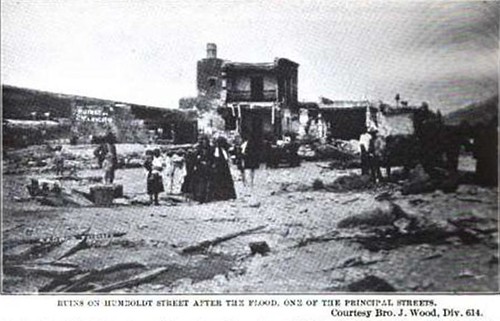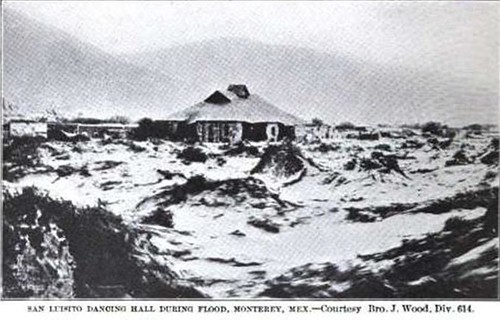 |
| Cerro de la Silla por Sam Chamberlain |
Tenemos aquí otra canción referente a esa misteriosa muchacha que atendía a los soldados de ambos ejércitos durante la Batalla de Monterrey.
El que entienda que me explique ¿qué hacía esta muchacha, quienquiera que fuera, metida entre el fuego cruzado de la guerra? Parece que la verdadera compasión no teme ni tiene enemigos.
La carta de un corresponsal del Loisville Courier en 1846 nos informa del hecho:
El que entienda que me explique ¿qué hacía esta muchacha, quienquiera que fuera, metida entre el fuego cruzado de la guerra? Parece que la verdadera compasión no teme ni tiene enemigos.
La carta de un corresponsal del Loisville Courier en 1846 nos informa del hecho:
“Mientras yo estaba detenido junto con nuestra ala izquierda en uno de los fuertes, la tarde del 21 (de septiembre de 1846), vi a una mexicana atareada en la faena de llevar pan y agua a los heridos de ambos ejércitos. Vi a este atento ángel levantar la cabeza de un herido, darle agua y alimento y entonces cuidadosamente vendar su horrible herida con un pañuelo que sacó de su propia cabeza. Después de haber agotado sus provisiones, volvió a su casa para traer más agua y pan para otros. Mientras corría en su misión compasiva para reconfortar a otros heridos, oí el estallido de un arma y ¡vi a la pobre e inocente creatura caer muerta! Pienso que fue un disparo accidental el que la alcanzó. No quisiera pensar de otra manera. Me causó mucho pesar y dándome la vuelta hacia el sitio, involuntariamente alcé mis ojos al cielo y pensé ¿Y s e
Por H. S Smith 1892 sto la guerra? Pasando por ese lugar al día siguiente, vi su cuerpo tendido allí, con el pan a su lado y el guaje quebrado con unas cuantas gotas de agua dentro de él – señal de su quehacer. La sepultamos y mientras cavábamos su tumba, volaron unas cuantas bombas de cañón entorno nuestro como saludos.”
"While I was stationed with our left wing in one of the forts, on the evening of the 21st, I saw a Mexican woman busily engaged in carrying bread and water to the wounded men of both armies. I saw this ministering angel raise the head of a wounded man, give him water and food, and then carefully bind up his ghastly wound with a handkerchief she took from her own head. After having exhausted her supplies, she went back to her house to get more bread and water for others. As she was returning on her mission of mercy, to comfort other wounded persons, I heard the report of a gun, and saw the poor innocent creature fall dead! I think it was an accidental shot that struck her. I would not be willing to believe otherwise. It made me sick at heart, and turning from the scene, I involuntarily raised my eyes towards heaven, and thought, and is this war? Passing the spot the next day, I saw her body still lying there, with the bread by her side, and the broken gourd with a few drops of water still in it—emblems of her errand. We buried her, and while we were digging her grave, cannon-balls flew around us like hail." (The Friend Magazine 1847)
La letra de esta canción es del Rev. James G. Lyons. La partitura se encuentra en esta página de la Biblioteca del Congreso de los Estados Unidos.
The Heroine of Monterey
The strife was stren at Monterey
When those high tow’rs were Lost and won;
And pealing thro’ that Mortal fray,
Flash’d bright the battery’s Vengeful gun;
Yet heedless of its deadly rain,
She stood in toil and danger first,
To bind the bleeding soldier’s vein
And slake the dying soldier’s thirst.
She found a pale and stricken foe
Sinking in nature’s last eclipse,
And, on the red earth kneeling low
She wet his parch’d and fever’d lips;
When thick as winter’s driving sleet;
The booming shot, and flaming shell,
Swept with wild rage that gory street,
And she_ the good and gentle _ fell.
They laid her in her narrow bed,
The foemen of her land and race;
And sights were breath’d, and tears were shed,
Above her lowly resting lace_
Ay! Glory’s crimson worshippers
Wept over her untimely fall,
For deed of mercy, such as hers,
Subdue the hearts end eyes of all.
To sound her worth were guilt and shame
In us, who love but gold and ease _
They heed alike our praise or blame,
Who live and die in works like these.
Far greater than the wise or brave,
Far happier than the fair and gay,
Was she who found a martyr’s grave
On that red fild of Monterey.
La Heroína de Monterrey
Solo traducción (no se adapta a la melodía)
La contienda era severa en Monterrey,
Cuando aquellas altas torres se perdieron y se ganaron
Y replicaron a través de la mortal refriega,
Luminosa y brillante, la batería del vengativo enemigo;
Pero sin hacer caso a su mortal lluvia,
Ella estuvo de pie, primera en el duro trabajo y en el peligro,
Para vendar las venas del soldado herido,
Y saciar la sed del soldado moribundo.
Encontró a un pálido y golpeado enemigo
Hundido en el último eclipse de la naturaleza,
Y, sobre la roja tierra de rodillas
Enjugó sus resecos y febriles labios;
Cuando espesa como la nieve del invierno,
La explosiva y encendida bomba,
Arrasó la salvaje y ensangrentada calle,
Y ella, la buena y amable, cayó.
Ellos la tendieron en su estrecha camilla,
Los enemigos de su propia tierra y raza;
Y se lanzaron suspiros, y se derramaron lágrimas,
Sobre su lugar de descanso al ras del suelo
¡Ay! Fieles de gloria carmesí
Llorad sobre su definitiva caída,
Por la deuda de una compasión como la de ella,
Someted los ojos y los corazones de todos.
Anunciar su valor provoca culpa y vergüenza
En nosotros, que amamos sólo las cosas fáciles y el oro
Llaman la atención tanto como nuestra alabanza o nuestra culpa,
Quien vive o muere en faenas como esa.
Más grande que el sabio o el valiente,
Más feliz que el hermoso o el alegre,
Fue ella, que encontró la tumba de un mártir
Sobre aquel campo rojo de Monterrey.
Por último les dejo aquí la melodía, esta vez no puse la letra entre lo dibujos de Chamberlain. No sé para ustedes pero a mi los dibujos esos me parecen un encanto. Y la música me recuerda las películas del oeste o el carrito de los helados. Allí se la dejo.















